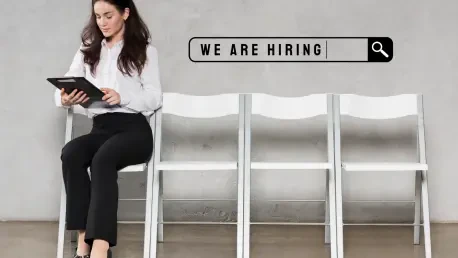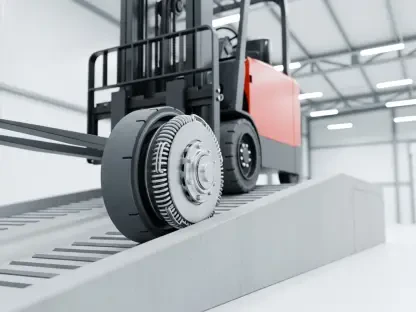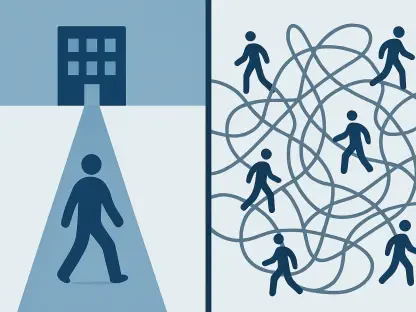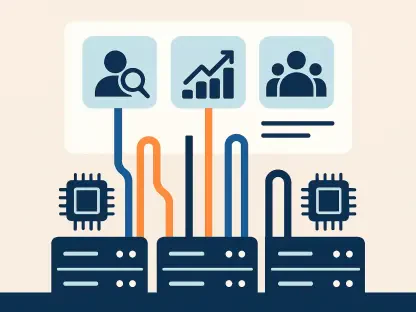In the bustling heart of Las Vegas, a luxury resort and casino faced an extraordinary challenge that seemed almost insurmountable: hiring 6,500 employees in just four months for a grand opening that had been delayed for nearly two decades. Fontainebleau Las Vegas, a name not yet familiar to the local market, had to overcome deep-rooted skepticism and fierce competition to build a workforce from the ground up. With such a tight timeline and a small talent acquisition team at the helm, traditional hiring methods would not suffice. The stakes were high, as failure to meet this target could jeopardize the resort’s long-awaited debut. What unfolded was a remarkable story of innovation, where artificial intelligence (AI) emerged as the linchpin of a strategy that defied expectations. This exploration dives into the hurdles faced, the cutting-edge technology deployed, and the transformative impact on recruitment, shedding light on a groundbreaking approach that redefined what’s possible in talent acquisition under pressure.
Breaking Through Market Doubt
The journey began with a significant barrier for Fontainebleau Las Vegas: a lack of brand recognition compounded by nearly 20 years of delays and false starts. Many in the local community doubted whether the resort would ever open, creating a steep uphill battle for the talent acquisition team. To counter this skepticism, a multi-faceted recruitment marketing campaign was launched, leveraging radio advertisements, prominent billboards across the city, and engaging social media content that showcased early hires. A dedicated career site was also developed to serve as a central hub for interested applicants. These efforts were meticulously designed to build credibility and generate buzz, ensuring that potential candidates saw Fontainebleau as a serious and promising employer. Despite the compressed timeline, this strategic push helped attract a massive pool of applicants, laying the groundwork for the intensive hiring process that followed and proving that perception could be shifted with the right approach.
Beyond just creating visibility, the campaign had to resonate with a diverse workforce in a highly competitive market. Las Vegas is a city teeming with employment opportunities, especially in hospitality, where job seekers have their pick of roles. The talent team knew that simply getting the word out wasn’t enough; they had to make Fontainebleau stand out as an employer of choice. By highlighting unique aspects of the resort’s vision and culture through authentic storytelling in their marketing materials, they managed to spark curiosity and interest. Social media posts featuring real employees offered a glimpse into the workplace environment, while the career site provided detailed insights into available roles. This thoughtful branding not only countered public doubt but also positioned Fontainebleau as a fresh and exciting player in the market, capable of drawing in talent despite the historical challenges and intense local competition that defined the hiring landscape at the time.
Harnessing AI for Unprecedented Efficiency
Central to Fontainebleau’s ability to meet its ambitious hiring goal was the adoption of AI technology through a partnership with a specialized platform. The AI tool, personified as Morris—a name inspired by the architect of the original Miami property—became a cornerstone of the recruitment process. Morris handled a wide array of tasks, from gathering critical application data like work history to conducting personality assessments and scheduling interviews. Remarkably, the tool reduced the application process to just three minutes, a vital feature when managing an overwhelming 300,000 applications, far surpassing the anticipated 80,000. The effectiveness of this streamlined approach was evident in the impressive 93% satisfaction rate reported by candidates in post-application surveys. This high level of approval underscored how AI could transform the often cumbersome hiring experience into something swift, user-friendly, and accessible for a vast number of applicants.
Moreover, the scale of the task demanded a level of automation that human recruiters alone could not achieve within the four-month window. The sheer volume of applications would have buried a traditional team under administrative burdens, risking delays and errors. Morris’s ability to process data and interact with candidates efficiently meant that no application fell through the cracks, even as numbers soared beyond expectations. This technology didn’t just save time; it maintained a consistent quality of engagement that kept candidates informed and involved throughout the process. By automating repetitive tasks, the AI ensured that the talent acquisition team could focus on higher-value activities, while still handling an unprecedented influx of interest. The result was a hiring pipeline that operated with precision and speed, demonstrating how technology can be a game-changer in high-stakes recruitment scenarios where every moment counts.
Meeting the Demands of a Nonstop City
Las Vegas is a city that never sleeps, and Fontainebleau’s recruitment strategy had to match that relentless pace. The AI tool’s round-the-clock availability proved to be a decisive advantage, engaging with candidates at any hour of the day or night. This was particularly crucial for job seekers working swing or overnight shifts, a common reality in the hospitality and gaming industries. Data revealed that 41% of candidate interactions occurred outside standard business hours, a testament to the necessity of constant accessibility. Without this flexibility, many potential hires might have dropped out due to delayed responses or inconvenient timing. Instead, Fontainebleau gained a competitive edge over other employers in the market who lacked such dynamic tools, ensuring that no opportunity to connect with talent was missed in a city where timing often makes all the difference.
Additionally, this 24/7 engagement capability addressed a critical pain point in recruitment: candidate retention through the application process. In a fast-paced environment like Las Vegas, job seekers often juggle multiple opportunities and have little patience for slow or unresponsive systems. The AI’s immediate interaction ensured that candidates felt valued and prioritized, reducing the likelihood of them seeking employment elsewhere. This responsiveness was not just about convenience; it was a strategic necessity in a market saturated with options for skilled workers. By aligning the hiring process with the unique rhythms of the city, Fontainebleau demonstrated an acute understanding of local dynamics. The ability to cater to diverse schedules without sacrificing efficiency highlighted how technology can be tailored to specific environmental challenges, ultimately strengthening the resort’s position as an adaptable and forward-thinking employer in a highly competitive landscape.
Navigating Unexpected Challenges with Tech
The road to hiring 6,500 employees was not without its share of crises, and AI played a pivotal role in managing sudden disruptions. A striking example occurred just one week before the launch of the Talent Center, when the original location was sold for a major event, necessitating an urgent relocation. With only days to adapt, the team relied on Morris to communicate the change to candidates through emails and text messages, while simultaneously updating all relevant platforms with the new address. This rapid response ensured that no applicant arrived at the wrong location, averting potential chaos and frustration. Such an incident showcased the versatility of AI beyond routine tasks, proving its value as a crisis management tool capable of handling logistical hurdles with speed and accuracy in a high-pressure situation where every detail mattered.
Furthermore, this adaptability extended to maintaining candidate trust during turbulent moments. A misstep in communication during a relocation could have damaged Fontainebleau’s reputation before it even opened its doors, especially in a market already skeptical of the resort’s viability. The seamless coordination facilitated by AI prevented such a setback, preserving the integrity of the hiring process. It also demonstrated to the talent team the broader potential of technology as a reliable partner in unforeseen circumstances. Rather than being overwhelmed by the last-minute change, the team could focus on other priorities, knowing that the AI had the situation under control. This incident reinforced the idea that in large-scale recruitment efforts, where unexpected obstacles are almost inevitable, having a robust technological framework can mean the difference between disruption and continuity, ensuring that momentum is never lost.
Transforming the Role of Recruiters
One of the most profound impacts of AI on Fontainebleau’s hiring strategy was the way it reshaped the role of recruiters. By automating time-consuming administrative duties such as data collection and interview scheduling, the technology freed the team to concentrate on meaningful candidate engagement. This shift allowed recruiters to emphasize the resort’s comprehensive value proposition, which included competitive salaries, family-friendly benefits like childcare stipends, and robust wellness programs. Instead of being bogged down by paperwork, they could build personal connections with applicants, addressing individual concerns and aspirations. This human touch, supported by AI efficiency, created a balanced approach that enhanced the overall candidate experience and helped secure top talent in a market brimming with alternatives.
Equally important was the elevation of recruiters into strategic contributors within the organization. Freed from mundane tasks, they could participate in critical areas such as benefits design, succession planning, and long-term talent management. This transformation positioned them as integral partners in shaping the resort’s future, rather than just facilitators of hiring. The technology acted as a supportive ally, amplifying their ability to make high-level decisions and contribute to broader human resources initiatives. Such a redefinition countered common concerns about AI replacing human roles, instead illustrating how it can enhance professional value. By fostering deeper relationships with candidates and aligning recruitment with organizational goals, recruiters at Fontainebleau became champions of a vision that went beyond filling positions, ultimately strengthening the foundation for the resort’s successful launch.
Reflecting on a Technological Triumph
Looking back, Fontainebleau Las Vegas achieved what many deemed impossible by successfully hiring 6,500 employees in under four months. This feat, accomplished despite historical delays and market skepticism, stood as a testament to the power of AI in overcoming monumental recruitment challenges. The technology not only streamlined an overwhelming volume of applications but also navigated crises with precision, ensuring a seamless process from start to finish. As a result, candidate satisfaction soared, and the resort carved out a competitive edge in a relentless city. Moving forward, this experience offers a blueprint for other organizations facing similar high-stakes hiring scenarios. Exploring AI tools that balance automation with human insight could unlock new efficiencies, while investing in candidate experience might become a defining factor in attracting talent. Fontainebleau’s story serves as an invitation to rethink traditional methods, paving the way for innovative strategies that meet the demands of tomorrow’s workforce.









